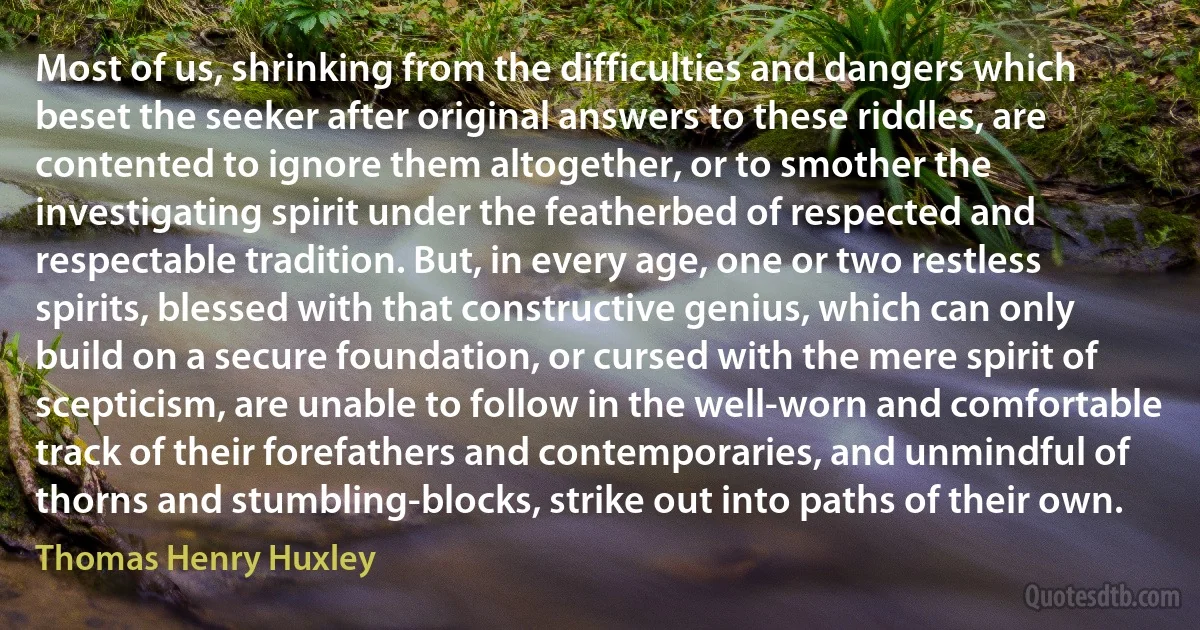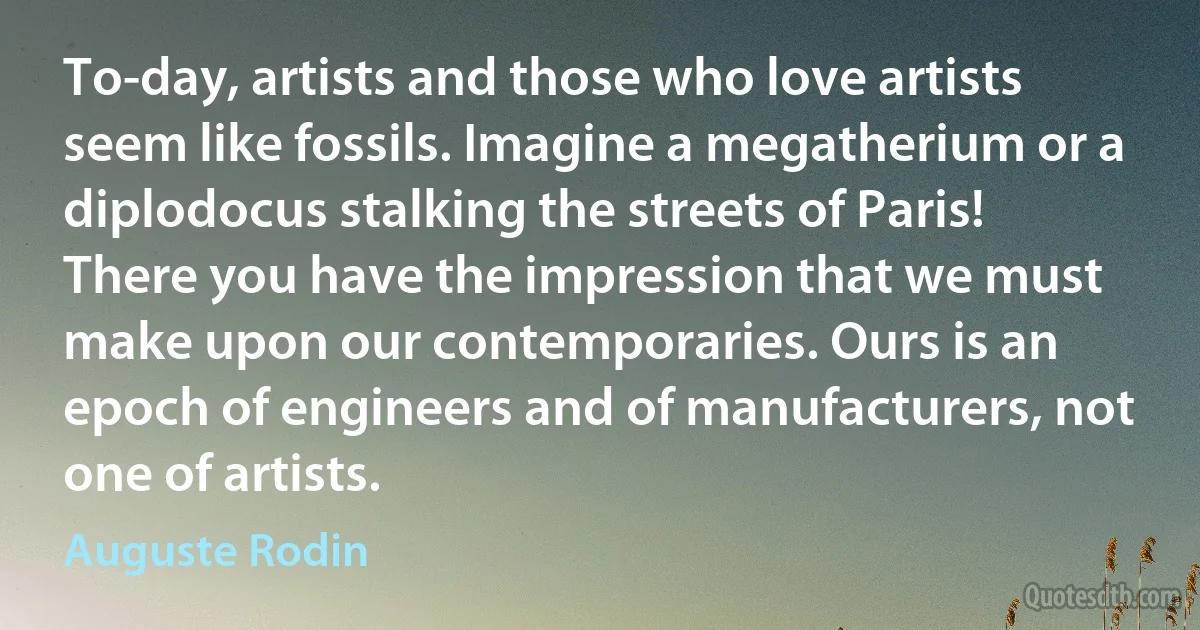Contemporaries Quotes - page 2
In this big moonlit landscape by the painter N.N., that deservedly celebrated technician, one sees more than one would wish, or that can actually be seen by moonlight. But what the perceptive, sensitive soul looks for in every painting, and rightly expects to find, is missing.. ..If that painter could find it in himself to paint fewer, but more deeply-felt, pictures instead of so many clever ones, his contemporaries and posterity would be more grateful to him.

Caspar David Friedrich
We commemorate a man, a leader, who in the years of creation and achievement towered above his contemporaries in figure and manner, in voice and power, who worked and fought, and who suffered-as they all suffered who dared to preach socialism in an unreceptive and hostile age. He was a man who had vision, and dared all in those years to make that vision a reality; a man who inspired affection in his associates as in his own domestic circle, and who, daring all, created a lasting and durable political instrument which today 60 years after its first political success, provides the Government of this country and in so providing owes more than many are prepared to admit to the young Ramsay MacDonald.

Harold Wilson
Perhaps I am more than usually jealous with respect to my freedom. I feel that my connection with and obligation to society are still very slight and transient. Those slight labors which afford me a livelihood, and by which it is allowed that I am to some extent serviceable to my contemporaries, are as yet commonly a pleasure to me, and I am not often reminded that they are a necessity. So far I am successful. But I foresee, that, if my wants should be much increased, the labor required to supply them would become a drudgery. If I should sell both my forenoons and afternoons to society, as most appear to do, I am sure, that, for me, there would be nothing left worth living for. I trust that I shall never thus sell my birthright for a mess of pottage.

Henry David Thoreau
Attempts to juggle domestic responsibilities with artistic production have often resulted in smaller bodies of work, and often works smaller in scale, than those produced by male contemporaries. Yet art history continues to privilege prodigious output and monumental scale or conception over the selective and the intimate.

Whitney Chadwick
We all bear traces of the starvation struggle which for so long made up the life of the race. Our very organism holds memories and glimpses of that long life of our ancestors which still goes on among so many of our contemporaries. Nothing so deadens the sympathies and shrivels the power of enjoyment as the persistent keeping away from the great opportunities for helpfulness and a continual ignoring of the starvation struggle which makes up the life of at least half the race. To shut one's self away from that half of the race life is to shut one's self away from the most vital part of it; it is to live out but half the humanity to which we have been born heir.

Jane Addams
History warns us, however, that it is the customary fate of new truths to begin as heresies and to end as superstitions; and, as matters now stand, it is hardly rash to anticipate that, in another twenty years, the new generation, educated under the influences of the present day, will be in danger of accepting the main doctrines of the 'Origin of Species' with as little reflection, and it may be with as little justification, as so many of our contemporaries, twenty years ago, rejected them. Against any such a consummation let us all devoutly pray; for the scientific spirit is of more value than its products, and irrationally held truths may be more harmful than reasoned errors.

Thomas Henry Huxley
A creator is not in advance of his generation but he is the first of his contemporaries to be conscious of what is happening to his generation.
A creator who creates, who is not an academician, who is not someone who studies in a school where the rules are already known, and of course being known they no longer exist, a creator then who creates is necessarily of his generation. His generation lives in its contemporary way but they only live in it. In art, in literature, in the theatre, in short in everything that does not contribute to their immediate comfort they live in the preceding generation.

Gertrude Stein
The economic policy issues that we debate today-trade policy, inflation, the proper role of government, the eradication of poverty, and the means of raising the rate of economic growth-have been discussed by economists for more than two centuries. Many of today's economic policies-both the good ones and the bad-are the result of the ideas of those past economists. And many of today's debates about economic policy can be understood only by those who have at least some familiarity with the ideas of earlier economists.
The giants of economic science during the past two hundred years have been men concerned with the critical policy issues of their time. They studied the working of the economy in order to advocate better economic policies. But despite their concern with policy, they were not polemicists or politicians but men who sought to persuade their contemporaries in government and in the broader public by analysis and evidence that would meet the standards of professional debate.

Martin Feldstein
[E]ven if a person excels in Torah and good deeds more than all his contemporaries, if he has not learned the secrets of Torah and the wisdom of truth, he must reincarnate in the world (...) Now the matter is clarified-the whole part of the revealed Torah is but a preparation to become worthy and merit attaining the concealed part. It is the concealed part that is very wholeness and the purpose for which man is created.

Yehuda Ashlag
We write in the language of Dryden and Addison, of Milton and Shakespeare, but the intellectual world we inhabit is that of Flaubert and Baudelaire; it is to them, and not to their English contemporaries, that we owe our conception of modern life. The artist whose reward is perfection and where perfection can be obtained only by a separation of standards from those of the non-artist is led to adopt one of four rôles: the High Priest (Mallarmé, Joyce, Yeats), the Dandy (Firbank, Beerbohm, Moore), the Incorruptible Observer (Maugham, Maupassant) or the Detached Philosopher (Strachey, Anatole France). What he will not be is a Fighter or Helper.

Cyril Connolly
Of the contributions made during the essayist period three call for notice: Weismann deserves mention for his useful work in asking for the proof that "acquired characters" or, to speak more precisely, parental experience can really be transmitted to the offspring. The ocurrence of progressive adaptation by transmission of effects of use had seemed so natural to Darwin and his contemporaries that no proof of the physiological reality of the henomenon was thought necessary. Weismann's challenge revealed the utter inadequacy of the evidence on which the beliefs were based. They are doubtless isolated observations which may be interpreted as favouring the belief in these transmissions, but such meagre indications as exist are by general consent admitted to be too slight to be of much assistance in the attempt to understand how the more complex adaptive mechanisms arose.

William Bateson
Art, moreover, is taste. It is the reflection of the artist's heart upon all the objects that he creates. It is the smile of the human soul upon the house and on the furnishing. It is the charm of thought and of sentiment embodied in all that is of use to man. But how many of our contemporaries fed the necessity of taste in house or furnishing? Formerly, in old France, Art was everywhere. The smallest bourgeois, even the peasant, made use only of articles which pleased the eye. Their chairs, their tables, their pitchers and their pots were beautiful. Today Art is banished from daily life. People say that the useful need not be beautiful. All is ugly, all is made in haste and without grace by stupid machines. The artist is regarded as an antagonist. Ah, my dear Gsell, you wish to jot down an artist's musings. Let me look at you! You really are an extraordinary man!

Auguste Rodin
This book is about three Frenchmen who lived and wrote against the grain of these three ages of irresponsibility. They were very different men and would have been surprised to think of themselves as a group, yet they have something rather distinctive in common. All three played an important role in the France of their lifetime but lived at a slightly awkward tangent to their contemporaries. For much of his adult life each was an object of dislike, suspicion, contempt, or hatred for many of his peers and contemporaries; only at the end of their long lives were Léon Blum and Raymond Aron, for quite different reasons, able to relax into the comfort of near-universal admiration, respect, and, in some quarters, adulation. Camus, who had experienced all three by the age of thirty-five, died twelve years later an insecure and much-maligned figure; it would be thirty years before his reputation would recover.

Tony Judt
There are also those who, like the author, ensconce themselves on a thunderous crag of omniscience, and with protestations of humility which are either unconvincing or totally absent, assume the obligation of appraisal, commendation, derogation or denunciation of their contemporaries. Still, by and large it is an easier job than digging a ditch.

Jack Vance



